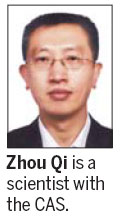Stem cell research promising
By Chen Jia and Shan Juan (China Daily)
Updated: 2011-01-29 07:42
BEIJING - After seeing the fastest development worldwide in stem cell research during the past 10 years, China is "on the verge of achieving a breakthrough", says a top scientist in the field.
Zhou Qi, chief scientist with the stem cell research project at the Chinese Academy of Sciences (CAS), spoke after the academy chose his area of expertise for significant attention.
He said Chinese scientists are expecting a major scientific breakthrough to be made within the next decade.
"We are now close to the day when we will be able to hail a breakthrough in this important technology," Zhou told China Daily during an exclusive interview.
He said China has already succeeded in creating a "stem cell line up to clinical standards", which signifies a major stride toward clinical treatment.
"China needs five to 10 years to shift from basic research to clinical application and another 10 years to realize large-scale clinical application," he said.
"If there are any science projects that could win China a Nobel Prize during the next 10 years, the most likely candidate is its stem cell research."
Going forward, the priority will be to focus on stem cell regulation, core mechanisms for stem-cell therapies and standardized applications of stem cells, Zhou said.
Scientists believe various kinds of stem cells - so-called because they are the foundation of all human cells - will eventually be used to treat deadly and debilitating ailments such as heart attacks, strokes, Parkinson's disease, diabetes, liver failure and even blindness.
Zhou described China's progress after the CAS designated stem cell and regenerative medicine research as one of the country's eight "strategic trailblazing research projects". Others among the eight include research projects into nuclear fission, space science and clean energy.
At the annual national meeting of the CAS, which ended on Thursday, the academy's vice-president, Bai Chunli, said the priority now will be to remove bottlenecks holding back China's stem cell research.
Bai said the CAS will establish a world-class research platform and base for stem cell and regenerative medicine research.

The platform will incorporate the four core research centers in Beijing, Shanghai, Guangzhou and Kunming and the resources of 17 research institutions around the country.
The research center in Beijing is responsible for project materials and organ construction; the Shanghai-based center focuses on establishing stem-cell regulation; the Guangzhou-based center focuses on biology and medicine and the center in Kunming is devoted to clinical animal experiments.
Zhou said China has achieved the fastest development in stem cell research of any country during the past 10 years. The number of research papers published by Chinese scientists about stem cell research is the fifth largest worldwide.
"But our international influence has not ranked among the first level and we are facing international concern about our lack of stem cell research regulations," he said.
Despite the fact that scientists such as Zhou are at the pre-clinical stage of their research, that has not stopped some institutions from offering untried treatments to desperate patients, despite the fact that such treatments are supposed to be unavailable.
Patients with incurable conditions have been visiting the country to receive experimental stem cell treatments not available in countries such as the United States.
Stem cell treatments are currently available in China for the treatment of such ailments as spinal cord injuries, leukemia and Parkinson's disease.
Many of the treatments are being offered thanks to a legal loophole and are available even though experts have warned they have not been proven to be either effective or safe.
Deng Haihua, a spokesman for the Ministry of Health, said the influx of foreigners traveling to China for such treatments will be slowed with new regulations.
Currently, "it's kind of a gray area and not well regulated," he conceded.
Luc Noel, an expert with the World Health Organization in Switzerland, said the WHO is discouraging such medical tourism.
"Given the high potential risks, the World Health Organization does not recommend medical tourists travel abroad to receive stem cell therapy," he said.
Internationally, regenerative medicine and stem cell therapies are deemed to be at the pre-clinical stage and, in limited cases, are the subject of clinical research, Noel said.
Zhou said research into stem cell treatments is important in China because "classical medical treatments based on medicine and surgery cannot meet soaring clinical needs".
The number of Chinese people suffering from organ defects caused by trauma, inherited problems, disease and aging is the largest in the world, he said.
Zhou said China would like to cooperate with international qualified repositories of stem cell material in the near future.
"The United States is once again pioneering basic research and the clinical application of stem cells," he said.
The US had, under the George W. Bush administration, banned the use of federal funding for new lines of embryonic stem cell research but President Barack Obama reversed that decision.
The US Food and Drug Administration has not yet approved the commercial use of any treatments using embryonic or fetal stem cells.
 DISCUSSION
GROUP
DISCUSSION
GROUP



Write a comment
Anass (Wednesday, 18 July 2012 02:20)
Nice post dude
sex tel (Tuesday, 17 January 2017 10:55)
wyleźć